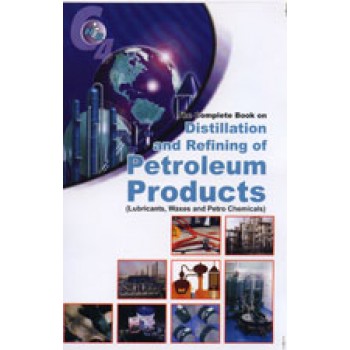The Complete Book on Distillation and Refining of Petroleum Products (Lubricants, Waxes and Petrochemicals)
| Price: | Rs.975.00 |
Detail Of The Complete Book on Distillation and Refining of Petroleum Products (Lubricants, Waxes and Petrochemicals)
| ISBN | 8186623973 |
| Pages | 496 |
| Language: | English |
| Product Code: | 1 |
| Size(in cm): | 21*13.5 cm |
| Weight(in grams): | 500(approx) |
Description:
The most dynamic industry of the century is the petroleum and petrochemicals industry. It has taken the fundamental knowledge of chemistry and chemical engineering and transformed itself from a simple processing industry for fuel and lubricants to an extremely complex chemical process industry which has branched out into synthetic rubber, plastics, fertilizers and many other fields. Petroleum (crude oil) is a mixture of different hydrocarbons. Many useful products can be made from these hydrocarbons. The fractions are separated from one another using a process called fractional distillation. This process is based on the principle that different substances boil at different temperatures. The applications of distillation in petroleum industry are quite varied. The assaying of crude oils and the evaluation many petroleum products depend on distillation. Petroleum products obtained from processes such as distillation often need supplementary purification. Refining is a process of purification of products by means of chemical process. Chemical engineering and petroleum processing have in a very real sense grown up together. Studies on fluid flow, heat transfer, distillation, absorption, and the like were undertaken and applied to wide variety of materials because of need in the petroleum processing field. The largest share of oil products is used as energy carriers: various grades of fuel oil and gasoline. Heavier (less volatile) fractions can also be used to produce asphalt, tar, paraffin wax, lubricating and other heavy oils. Refineries also produce other chemicals, some of which are used in chemical processes to produce plastics and other useful materials. Hydrogen and carbon in the form of petroleum coke may also be produced as petroleum products. Petrochemicals have a vast variety of uses. The use of petroleum hydrocarbons to make synthesis gas has made petroleum and natural gas the world main source of ammonia, the source of almost all nitrogen fertilizers. While petroleum product demand in the western world is relatively stagnant, for developing countries, particularly those in Asia, demand is booming. It is all about growing populations and their escalating need for energy.
Some of the fundamental of the book are the nature of petroleum, crude oil processing, distillation in the petroleum industry, refining of lubricating oils, petrolatum, and waxes, residue fluidized catalytic cracking, chemical thermodynamics of petroleum , benefits of biodiesel produced from vegetable oil, petroleum products used as fuel oils, manufacture of asphalt from petroleum, petroleum waxes, chlorinated waxes, synthesis gas etc.
The book presents information and data which will help oil companies, large scale users of commercial petroleum products in efficient storage, handling and utilization of these products. Different formulae, processes for the production of petroleum products are given in this book. This will be very useful book for new entrepreneurs, existing units, technocrats, researchers, institutional libraries etc.
Reviews (0)
There are no reviews for this product.
Write a review
Your Name:Your Review:
Note: HTML is not translated!
Rating: Bad Good
Enter the code in the box below:



 |
| 